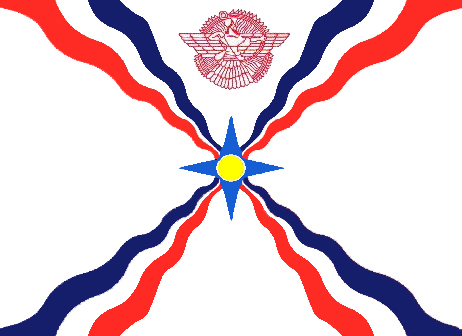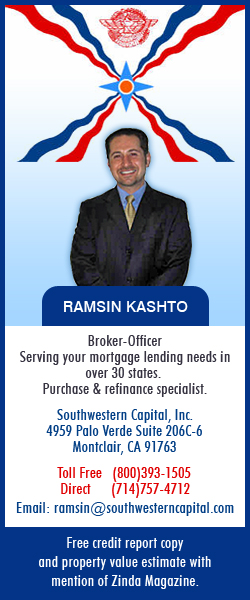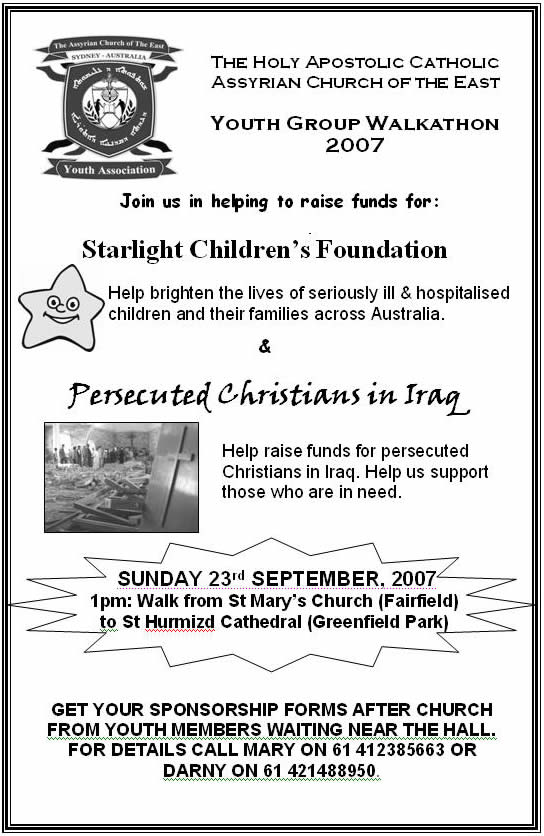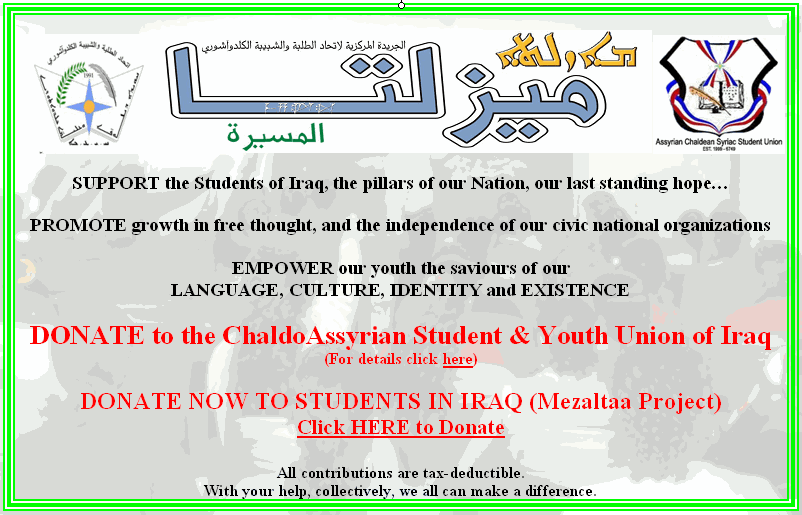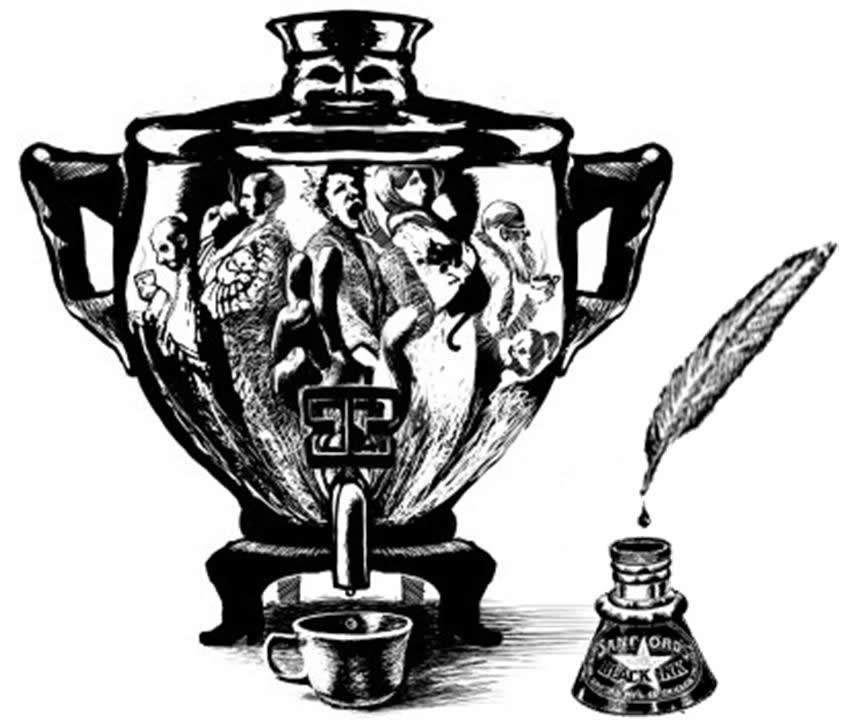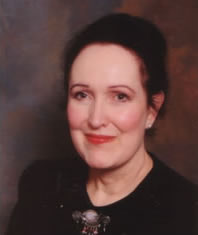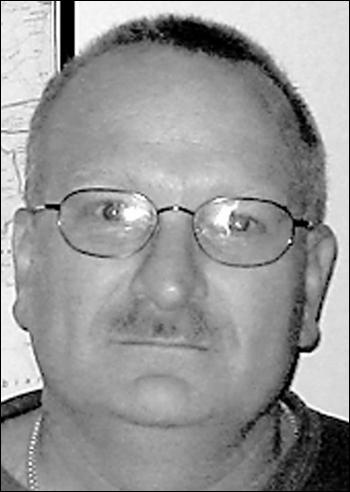U.N. Adopts Indigenous Rights Declaration
Courtesy of BBC
14 September 2007
(ZNDA: New York) The United Nations General Assembly has adopted a non-binding declaration on the rights of indigenous peoples after 22 years of debate.
The document (click here) proposes protections for the human rights of native peoples, and for their land and resources.
It passed despite opposition from Australia, Canada, New Zealand and the United States. They said it was incompatible with their own laws.
There are estimated to be up to 370 million indigenous people in the world.
They include the Innu tribe in Canada, the Bushmen of Botswana and Australia's Aborigines.
Campaigners say they are under greater pressure than ever, as developers, loggers, farmers and mineral extractors move in on their land.
'Important symbol'
The Declaration on the Rights of Indigenous Peoples calls on countries to give more control to tribal peoples over the land and resources they traditionally possessed, and to return confiscated territory, or pay compensation.
The General Assembly passed it, with 143 countries voting in favour and 11 abstaining.
Four nations - Australia, Canada, New Zealand and the United States - each with large indigenous populations, voted against.
Australia said it could not allow tribes' customary law to be given precedence over national law.
"There should only be one law for all Australians and we should not enshrine in law practices that are not acceptable in the modern world," said Indigenous Affairs Minister Mal Brough.
A leader of a group representing Canada's native communities criticised his government's decision to oppose the declaration.
"We're very disappointed... It's about the human rights of indigenous peoples throughout the world. It's an important symbol," said Phil Fontaine, leader of the Assembly of First Nations.
 Assyrians are considered the indigenous people of Iraq, Syria, Iran, and Turkey - the four countries whose areas partially or totally encompass the lands were for centuries occupied by the ancient Assyrians. All four countries were in favor of the Resolution signed on 13 September 2007. Assyrians are considered the indigenous people of Iraq, Syria, Iran, and Turkey - the four countries whose areas partially or totally encompass the lands were for centuries occupied by the ancient Assyrians. All four countries were in favor of the Resolution signed on 13 September 2007.
Assyrians in Gen. Patraeus Testimony Before U.S. Senate
Following is a transcript of Nebraska's Senator Ben Nelson’s comments and questions during the Senate Armed Services Committee hearing. It includes comments from General David Patraeus and the U.S. Ambassador to Iraq, Ryan Crocker:
BEN NELSON: Thank you, Mr. Chairman. And let me add my appreciation, publicly, to you both for your service.
Before the surge in Baghdad, do we know what the mix was of residents of Sunnis, Shias and others, approximately?
PETRAEUS: What we have, Senator, is, literally, is a map that shows reasonably where there were predominantly Sunni, predominantly Shia, predominantly mixed.
PETRAEUS: And we have continued to track that. And tragically, one of the outcomes of the ethno-sectarian violence has been hardening of those certain areas into either more exclusively Shia or Sunni and the diminution of some of the mixed neighborhoods.
BEN NELSON: Well, in addition, has it resulted in a loss of Sunni residents in Baghdad, as well?
PETRAEUS: There has been displacement of Sunnis from Baghdad throughout the sectarian violence. And of course -- again, this is why we have focused on that subset that I mentioned, of overall deaths, the ethno-sectarian deaths, because that is the cancer that just keeps eating at the fabric of Iraqi society. And it won't stop if it is not stopped. It's not going to stop until something does, in fact, stop it. And in this case, it is coalition and Iraqi forces stabilizing those neighborhoods and then trying to achieve a sustainable situation for the way ahead.
BEN NELSON: Well, do we know what the percentage of loss of Sunnis is in the Baghdad area?
PETRAEUS: Sir, I don't have the...
BEN NELSON: 10 percent, 20 percent loss? PETRAEUS: I couldn't -- could not hazard a guess. They have -- there has been substantial Sunni Arab displacement from Baghdad. There has also been tragic displacement of Assyrian Christians from Baghdad. Those two, probably, most of all.
BEN NELSON: And out of the south. Out of the southern Shia region as well, it's my understanding. There's been an exodus of Christians from south. Were you aware of that?
PETRAEUS: Sir, I am less aware of that and more aware of the challenges to Assyrian Christians in Baghdad and also in some of their former areas in northern Iraq.
BEN NELSON: I've heard that there may have been displaced as many as 800,000 Christians in the Shia regions in southern Iraq. Ambassador Crocker, do you know anything about that?
CROCKER: No, sir, I don't. I'll certainly check into that. We are in regular touch with Christian representatives, and I am, myself. Their concerns have been focused on Baghdad and areas to the north. I never heard them raise a problem in the south.
BEN NELSON: It's my understanding that the problem is with the militias and the ethno-cleansing that is going on there as well.
PETRAEUS: Sir, I think, literally, it may be South Baghdad. There's one area, in particular, of Southeast Baghdad that was, in fact, the Dora area a -- in Assyrian Christian, or Christian, in general, enclave from which there has been tragic displacement.
BEN NELSON: I think they really had a reference to both, so if we would check, that would be helpful.
And you mentioned that when it comes to the south, that there have been loss of a couple of governors. A couple of governors sitting here thought that might be -- former governors sitting here thought that might be fairly significant.
PETRAEUS: It is very significant, sir.
Rep. Anna Eshoo's Letter to Washington Post
Following is the complete text of Rep. Anna Eshoo (D-California) printed in the Washington Post on 3 September 2007 titled "Mr. Bush Has Forsaken Iraq's Minorities":
Nina Shea's op-ed called attention to the important issue of protecting the diminishing number of religious and ethnic minorities in Iraq (click here). As a first-generation American whose Assyrian grandparents fled their ancestral homelands in what is now the northern border area between Iraq and Iran, I've worked with congressional colleagues for years to address the plight of Iraq's minority populations. Unfortunately, the Bush administration has ignored our bipartisan calls for action.
In 2005, I offered language, approved unanimously by the House, to encourage the State Department to direct its attention to the needs of Iraq's indigenous religious minorities. Nothing has happened since then.
Meanwhile, the exodus of Iraqi minorities has intensified. In June, 73 members of Congress joined me in writing to President Bush urging him to take seriously the grave warnings expressed to him by Pope Benedict XVI regarding Iraq's endangered Christian population. There has been no response. Again in June, the House passed the foreign operations appropriations bill with $10 million in aid to Iraqi minorities living in the Nineveh Plains. The administration has threatened a veto over unrelated concerns.
Iraq's minority communities have endured for more than 2,000 years, even under brutal despots. Under the United States' watch, the seeds of a diaspora have been sown, and these communities, cultures and historical legacies are on the brink of extinction.
It's time for the administration to abandon the policy of neglect and join with Congress to ensure that these communities have the assistance they need to persevere and flourish within Iraq for many generations to come
USCIRF to Secretary Rice: U.S. Must Address Threats to Religious Minorities in Iraq
The U.S. Must Take Action!!!!
September 7, 2007 — The U.S. Government needs to take action. That was the message from the United States Commission on International Religious Freedom, an independent, bipartisan federal agency. In a letter from Chairman Michael Cromartie to Secretary of State Condoleezza Rice, he urges the U.S. government to address the severe threats to Iraq's smallest religious minorities.
"We commend Mr. Cromartie on the letter and fully support his message," said Jackie Bejan with the Chaldean Assyrian Syriac Council of America (CASCA).
In the letter Cromartie writes, "While all Iraqis are threatened by violence, the non-Muslim minorities face particularized forms of harassment and abuse; what is more, these groups appear to suffer a degree of violent attacks and other human rights abuses disproportionate to their numbers."
The Commission urges the U.S. government to take more effective action to respond to the flood of refugees and internally displaced people—a crisis that has grown in part due to sectarian violence. The Commission will hold the second of two public hearings on the situation in Iraq on Sept. 19. This hearing will examine intra-Muslim sectarian violence, including what role, if any, the Iraqi government currently plays in that violence. That hearing will also examine U.S. policy in relation to Iraq's refugee crisis.
In the letter, the Commission urges several steps the U.S. government and Iraqis can take to boost protection of Iraq's endangered religious minority communities, including police training and the U.S. government convening a symposium of minority representatives to examine ways to improve security. It calls for increased humanitarian and development assistance and measures to ensure that aid reaches the intended beneficiaries. The Commission also recommends increased U.S. support for international agencies working with displaced people.
The Chaldean Assyrian Syriac Council of America (CASCA) is a non-profit organization dedicated to matters of public policy and political purpose of the common benefit of the society of Assyrian/Chaldean/Syriac people in Diaspora and those in the indigenous lands of Bet-Nahrain.
For additional information, please visit http://www.uscirf.gov or contact Jackie Bejan at jbejan@casca.us.
Following is the full text of Chairman Michael Cromartie to Secretary of State Condoleezza Rice:
The Honorable Condoleezza Rice
Secretary of State
United States Department of State
2201 C Street NW
Washington, DC 20520
Dear Secretary Rice:
On behalf of the United States Commission on International Religious Freedom, I strongly urge you to give the highest attention to the severe threat facing the smallest religious minorities in Iraq. During the Commission's meeting with you this past May, we expressed concern that the U.S. government was not taking adequate action to provide protection for these ancient communities, who include ChaldoAssyrian Christians, Sabean Mandaeans, Yazidis, and others, and that as a result of extremist violence and government harassment, they are facing extinction from lands they have occupied for over 2,000 years. While all Iraqis are threatened by violence, the non-Muslim minorities face particularized forms of harassment and abuse; what is more, these groups appear to suffer a degree of violent attacks and other human rights abuses disproportionate to their numbers. Indeed, last month's heinous attack deliberately targeting the Yazidi community was only the latest in a long line of similar attacks against similarly defenseless non-Muslim targets in Iraq.
As you know, the Commission has long been raising concern about the plight of Iraq's religious minorities with Administration officials. As far back as December 2004, the Commission wrote to President Bush regarding the escalation of violent attacks against members of these groups. Earlier this year, the Commission added Iraq to its Watch List due to the alarming and deteriorating religious freedom conditions for all Iraqis, including the religious minorities. In July, the Commission held a hearing on the threats these minority communities face. We received testimony of minority members viciously and deliberately victimized by militants—and, witnesses claimed, even members of the police and security forces—that included murder, torture, and abductions for ransom; of parishioners sleeping on the floors of churches to escape death squads and insurgents; of families being given just one hour to vacate their homes; of expropriated land, forced conversions and extortion in the form of taxes on non-Muslims.
On September 19, the Commission will hold a second public hearing on the grave situation in Iraq. This hearing will examine the causes, dimensions, and patterns of intra-Muslim sectarian violence, including the extent to which individual Muslims are being targeted
for killings and other violence on account of their religious identity and what role, if any, the Iraqi government currently plays in that violence. That hearing will also examine U.S. policy in relation to Iraq's refugee crisis, focusing on internal displacement and Iraqis sheltering in neighboring countries.
Grave Threat to Religious Minorities
Violence against members of Iraq's Christian community occurs throughout the country, and the Commission has raised particular concern about reports from Baghdad, Mosul, Basra, and the northern Kurdish regions. Other reported abuses include the assassination of Christian religious leaders, the bombing and destruction of churches, enforced conformity with strict Islamic dress and behavioral codes, and violent threats that have forced people from their homes. In some areas, ordinary Christians have reportedly stopped participating in public religious services for fear of inviting further violence. Though smaller in number, Sabean Mandaeans and Yazidis have suffered similar abuses, as has the dwindling Jewish community. Extremists view members of these groups as infidels or outsiders who must be eliminated. What is more, religious minority communities reportedly lack means of protection, including local militia structures that might otherwise provide security.
Faced with these harsh realities, thousands of members of Iraqi religious minorities have fled the country, seeking refuge in neighboring states and among growing diaspora communities in the West. According to some reports, nearly half of Iraq's indigenous Christian population is now living outside the country. Although comprising only 4-5 percent of Iraq's pre-war population, the UN High Commissioner for Refugees (UNHCR) reports that almost 40 percent of registered refugees are Christians. According to the Mandaean Society of America, approximately 85 percent of Iraqi Mandaeans have fled their country since 2003.
With almost 2.2 million persons displaced within Iraq, equaling the number of Iraqis who have fled the country, there will soon be more internally displaced Iraqis than Iraqi refugees. Those fleeing sectarian violence are moving from religious and ethnically mixed communities to homogeneous ones as they seek safety and protection. In the case of the non-Muslim groups, many are moving to the Nineveh Plains, an area located south of the Kurdish Regional Governorate and constituting a portion of the Nineveh Governorate.
Commission Recommendations
With the rising sectarian violence, the Iraqi internally displaced persons (IDP) and refugee crises require heightened attention and more effective action by the U.S. government. Given the urgency of their plight, it was proposed at our May meeting that the U.S. government hold a series of conferences, both in and outside Iraq, bringing together representatives of Iraq's non-Muslim minorities, particularly civic leaders, mayors, and other locally elected officials, to hear directly from them what the United States could do to ensure their protection—indeed, their very survival—in Iraq. We respectfully request that you instruct the Department of State to follow up on this proposal, as there is clearly a pressing need to safeguard the presence of these ancient communities on their ancestral lands.
In taking this and other actions to protect Iraq's endangered minority religious communities, the Commission respectfully proposes that the U.S. government should:
— Urgently convene, as discussed at our May 11 meeting, the symposium or summit of civic leaders, elected officials, and other representatives of Iraq's endangered religious minority communities to learn first-hand what actions could be taken to advance their security in Iraq. Among the actions that might be discussed at such a conference, in order to enforce protections for these minority communities, is the initiative to create an autonomous administrative district in the Nineveh Plains, as provided under article 125 of the Iraqi Constitution.
— Ensure that the U.S. government contributes promptly and sufficiently to UNHCR's revised appeal on Iraq to address the humanitarian concerns of Iraq's displaced population, encouraging other nations also to contribute to this appeal by our own example.
— Increase humanitarian assistance to Iraq, ensuring that non-Muslim minorities who, in the face of disproportionate levels of violence and fear of persecution, are fleeing to the Nineveh Plains, receive adequate aid; direct that that aid be distributed in coordination with local humanitarian and civil society organizations and international humanitarian agencies, as appropriate; and ensure that assistance reaches the intended beneficiaries.
— Support, working in consultation with civic leaders, elected officials , and other representatives of minority religious groups, basic infrastructure development projects, including water, electricity, and roads, in the largely undeveloped Nineveh Plains so that members of minority religious communities fleeing violence can resettle in a region that is the ancestral land for many of them, and seek international support for these and similar initiatives.
— Urge, at the highest levels, the Kurdish Regional Government (KRG) to respond to complaints that it is taking or encroaching on these ancestral lands and the other areas in the Nineveh Plains populated by members of Iraq's minority religious communities, and ensure that the KRG is not facilitating any form of encroachment; and urge the KRG to investigate and hold accountable any officials or others acting in the name of the KRG who have improperly exercised power to deprive local minority communities of their property, land, houses, or other items essential to their survival.
— Authorize U.S. police trainers to train local police forces in the Nineveh Plains from among the minority religious communities—most of whom are defenseless victims of various Sunni, Shi'a, or Kurdish militants—so that they can protect the security of their community members and themselves, and investigate any alleged abuse of power by KRG officials.
— Work promptly, both independently and with its allies, to facilitate family reunification abroad for the remaining—and reportedly highly vulnerable—small Jewish minority.
— Reexamine and subject to independent review U.S. government data collection procedures with regard to killings, abuses, and other atrocities in Iraq, particularly those collection procedures carried out by the Department of Defense, to ensure maximum reliability and accuracy, and add explicit data categories to record the killings and other abuses that specifically target religious minority communities there. Maintaining accurate data in this area is crucial, especially in light of the grave threat facing many of those ancient communities.
— Ensure the continuation of privately-run peace and reconciliation efforts among Iraq's various religious leaders and facilitate these exchanges, despite ongoing insecurity, by providing, as appropriate, for such sessions to be held outside Iraq.
After our next hearing, the Commission intends to issue additional recommendations on Iraq addressing the problem of the intra-Muslim sectarian violence and related religious freedom abuses, which we plan to forward to you at that time.
Madame Secretary, the situation for the non-Muslim minority communities in Iraq has gone beyond critical. As we said when we met with you, it is time for the U.S. government to act. Canon White told us at our July hearing that "We … need to face the fact that we in the coalition have seriously ignored and failed to deal with the plight of minorities. Therefore we must accept a considerable amount of responsibility for the present crisis." Clearly, given the U.S. government's role in the developments that have resulted in the dire situation currently facing the imperiled members of Iraq's religious minority communities, our country has a special obligation to provide them protection and thereby attempt to secure their continued existence in Iraq.
Sincerely,
Michael Cromartie
Chair
cc: John D. Negroponte, Deputy Secretary of State
R. Nicholas Burns, Undersecretary of State for Political Affairs
Paula J. Dobriansky, Undersecretary of State for Democracy and Global Affairs
Jonathan Farrar, Acting Assistant Secretary of State for Democracy, Human Rights, & Labor
John V. Hanford, III, Ambassador at Large for International Religious Freedom
David Satterfield, Senior Adviser, Coordinator for Iraq
Stephen J. Hadley, National Security Advisor
Michael G. Kozak, Senior Director for Democracy, Human Rights and International Organizations, National Security Council
U.S. Called to Secure Existence of Endangered Iraqis
Courtesy of the Christian Post
By Michelle Vu
11 September 2007
(ZNDA: Washington) Politicians, pundits, and the media are in a frenzy this week over Iraq as the top U.S. commander in Iraq and the U.S. ambassador to the war-torn country testify before Congress.
Troop withdrawal, Iraq government progress or lack thereof, and Sunni-Shiite violence are highly popular topics of discussion. Very little, however, has been said about one of Iraq’s most endangered communities – the indigenous Christian population.
Since the 2003 U.S.-led offensive, nearly 2.2 million Iraqis have left the country. Christians, who account for only three percent of the Iraq’s population, are estimated to make up nearly half of all the refugees fleeing the country, according to the U.N. High Commissioner for Refugees.
“The situation is more than desperate,” said the Rev. Canon Andrew White, who leads one of the largest churches in Iraq, at a U.S. Commission on International Religious Freedom (USCIRF) hearing in July. “The Coalition has failed the Christians. We have done nothing to support the Christian community or the increase Christian suffering.”
White is vicar of the 1,300-membered St. George’s Anglican Church in Baghdad where he says the U.S. commander in Iraq, Gen. David Petraeus, attends service.
In response to the growing refugee crisis, USCIRF wrote a letter last week to Secretary of State Condoleezza Rice urging the U.S. government to address the serious threats to Iraq’s religious minorities.
“While all Iraqis are threatened by violence, the non-Muslim minorities face particularized forms of harassment and abuse; what is more, these groups appear to suffer a degree of violent attacks and other human rights abuses disproportionate to their numbers,” read the letter dated Sept. 5 and signed by Chairman Michael Cromartie on behalf of the Commission.
The letter specifically mentioned Chaldo-Assyrian Christians as one of the ancient communities facing intense persecution and possible “extinction” in Iraq. Assyrian Christians draw their lineage back to Babylonian times and are one of the oldest Christian communities in the world.
Reported abuses against Iraqi Christians include the assassinations of Christian religious leaders, bombings and destruction of churches, enforced conformity with strict Islamic dress and behavioral codes, and violent threats that have forced people from their homes, according to USCIRF.
“The situation for the non-Muslim minority communities in Iraq has gone beyond critical,” emphasized the federal government agency.
“Clearly, given the U.S. government’s role in the developments that have resulted in the dire situation currently facing the imperiled members of Iraq’s religious minority communities, our country has a special obligation to provide them protection and thereby attempt to secure their existence in Iraq.”
During his presentation to Congress, Patraeus said that the troop surge has been effective in helping to stabilize Iraq. He also said the 30,000 additional troops could come home by next July, but planning for further U.S. withdrawals would be “premature,” according to CNN.
The U.S. commander in Iraq has been praised by the Rev. White for doing an “incredible job” despite the difficulties he faces working with an unstable Iraqi government and overall environment.
Assyrians in Germany Demonstrate For Assyrians in Iraq
(ZNDA: Berlin) On 7 September some 60 Assyrians held a protest in front of the U.S. Embassy in Berlin to protest the lack of attention for the Assyrians of Iraq and their aggravating conditions as internally displaced people and refugees in Syria and Jordan.
Participants in the protest included members of the Assyrian political parties and churches in Germany.
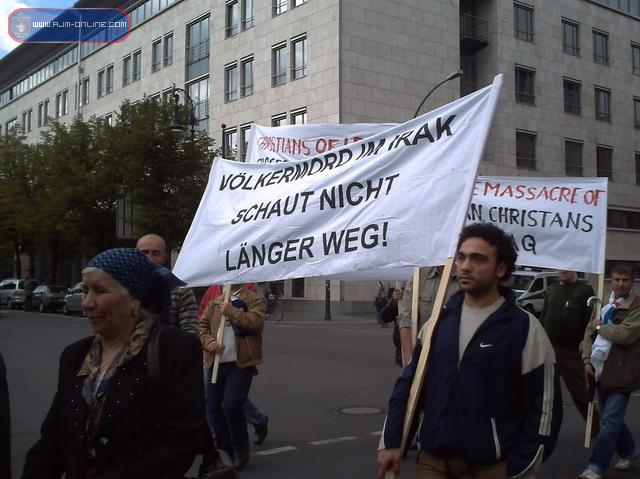 |
Assyrians in Germany protest the treatment of their fellow Assyrians in Iraq in front of the U.S. Embassy in Berlin.
Photo courtesy of AJM-Online. |
Iraqi Man Smuggled Across US Border Granted Asylum
Courtesy of the Associated Press
30 August 2007
(ZNDA: San Antonio) An Iraqi Christian who used migrant smugglers to slip him into the United States after escaping persecution in his home country has been granted political asylum and will be allowed to stay.
An immigration judge granted [Amir Behnan Polous] Aamr Bahnan Boles' request on Wednesday after hearing testimony about brutality Boles could face if deported to Iraq. Prosecutors did not object to Boles' asylum request.
"I only asked you for your mercy," the 26-year-old Boles said. "And I thank you very much."
Boles escaped from Iraq and went to Syria, Russia, Cuba and then Guatemala before making his way through Mexico to the Texas border, where he was captured with two other young Iraqi men as they swam the Rio Grande in April 2006.
The trio claimed asylum on grounds they were subjected to brutality and threats in Iraq because of their faith.
Boles told the San Antonio Express-News that he hopes to use his new legal status to help his family escape Iraq.
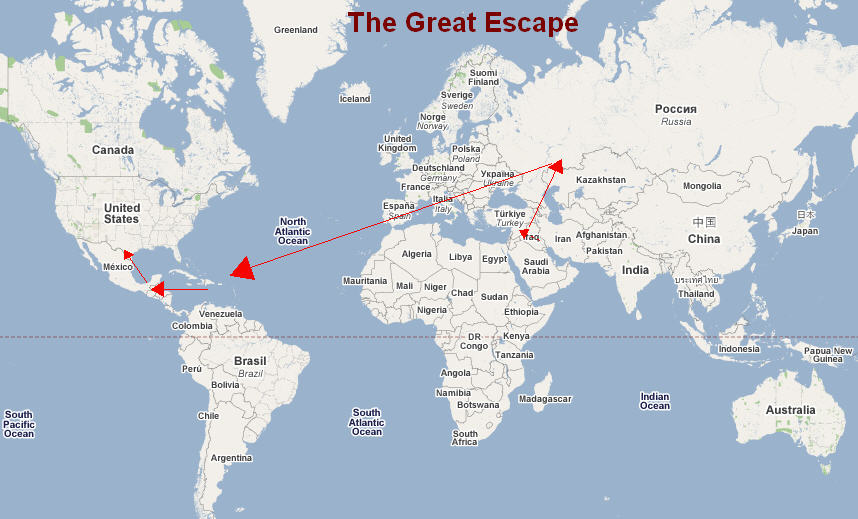 |
| Amir Polous' escape route from Iraq to Syria, Russia, Cuba, Central America, and then across the US-Mexico border into Texas. Such escape routes from Iraq to the nearby Mid-East countries, to Russia or the Indian sub-continent and then to Central or South America on through Mexico and finally into U.S. are becoming familiar patterns of escape for desperate Assyrians of Iraq. With nearly one million Assyrian refugees in Jordan and Syria, the plight of the Iraqi Christians is expected to be the worst in modern history. The U.S. government and the Bush Administration continues to disregard any solutions within and outside the Iraqi borders for the Christians of Iraq. (Map by Zinda Magazine) |
Possible Assyrian-Iraqis Captured in Peru en Route to U.S.
Courtesy of the Washington Times
11 September 2007
By Kelly Hearn
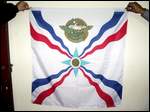 |
One of the 10 Iraqis arrested in Peru was clutching this Assyrian flag. A Peruvian investigator dismissed the idea that they were Chaldean Christians seeking asylum in the U.S. |
(ZNDA: Lima) Ten Iraqi citizens with forged passports and documents are in a Peruvian prison after an apparent bid to enter the United States on a flight to Los Angeles, officials say.
An 11th Iraqi man thought to be part of the group is at large.
One of the men arrested is thought to have links to al Qaeda, said Peruvian National Police Col. Roberto Lujan, who is leading the investigation.
The capture of the 10 in this Andean nation raises the specter of a smuggling ring that could touch neighboring Ecuador.
The plot unfolded on June 21, when three Iraqis entered Jorge Chavez International Airport in Lima attempting to board a flight to Los Angeles.
Airline officials alerted police after two of the men holding Dutch passports could not speak Dutch. Citizens of the Netherlands are not required to hold a visa to enter the United States.
Police detained the suspects and learned that another group of Iraqis had been en route to the airport.
"The others were slowed by traffic on their way to the airport," Col. Lujan said. "When they arrived, they apparently saw what was happening and left."
None of the three Iraqis arrested in the airport spoke Spanish. One gave police the name of a 40-year-old Spanish-speaking Iraqi citizen named Rafid Joboo Pati, the group"s reputed leader.
Police said the Iraqis entered Peru on May 11 and passed through the Dominican Republic, Costa Rica and Ecuador without authorities noticing that their documents were fake.
Peruvian intelligence units spent several days watching Mr. Pati, who was residing in the upscale Lima neighborhood Miraflores, Col. Lujan said. Others thought to be part of the smuggling ring also were watched.
On the night of July 17, police raided three apartments where the suspects were living and arrested seven persons, including Mr. Pati.
Mr. Pati confirmed that all of the suspects were Iraqis. Two had Dutch passports, two carried Ecuadoran identification and two held Iraqi passports, police said. Mr. Pati carried an Ecuadoran passport, Col. Lujan said.
Authorities found no weapons but seized a laptop computer and cell phones that they turned over to Interpol in France.
An 11th person was not in the apartment at the time of the raid and is at large, officials said.
Those detained are brothers Dane-K-Mansour, 26, and Nail Mansour, 29, Mushtaq-y-Hana, 24, Loayi-s-Elda, 29, Jaboo Pati-Rafid, 40, Adelmika Homow, 61, Salema Hazim, 53, Ala Tomina, 30, Istab Hekmat, 28, and Rafid Joboo Pati, 40.
"The Iraqis refused to give the name of the missing individual," Col. Lujan said.
Interpol advised Peruvian police that two of the Dutch passports were reported stolen last year.
"We have been told by Interpol sources in Lima that fingerprints of one of the men carrying a Dutch passport have been sent to Baghdad and is thought to have links to al Qaeda," Col. Lujan said, adding that he could not identify the man for security reasons.
All are detained at Lima"s Lurigancho prison. They are prohibited from giving interviews to the press.
The suspects were not employed during their stay in the high-end neighborhood, authorities said.
"Someone was funding them but we do not know who yet," Col. Lujan said, adding that his department is working on the investigation with U.S. officials and Interpol.
"We are very satisfied with how the Peruvian authorities are handling the matter," said Sam Wunder, a U.S. Embassy spokesman in Lima. "We are very interested in finding out more about these people."
U.S. officials in Washington would not comment on the investigation because it is continuing.
Col. Lujan rejected a theory that the men could be Chaldean Christians, a group said to frequently attempt entry to the United States on claims of religious persecution in Iraq.
"These people were not part of a group," he said. "Besides the brothers, they did not even know each other."
One man was arrested while clutching a flag of unknown origin. A photo shows the flag to have a white background with four squiggly blue and red lines converging onto a four-pointed light blue symbol that is similar to those found on Chaldean flags.
Officials said they do not know whether other Iraqi smuggling rings have operated in the country. One police official who declined to be identified said he doubted the ring was still operating in Peru.
"They might be in Ecuador because they know we are looking for them here," Col. Lujan said.
 The detainees noted in the above article may indeed be Assyrians of Chaldean faith from Iraq, misidentified by the Peruvian authorities in Lima. Zinda Magazine urges the Assyrian federations in the United States, Europe, and Australia to contact the Peruvian Embassies in their adopted countries at once and follow-up with the authorities in Lima. The Peruvian Embassy in D.C. can be contacted at (202) 833-9860. Fax: (202) 659-8124. The detainees noted in the above article may indeed be Assyrians of Chaldean faith from Iraq, misidentified by the Peruvian authorities in Lima. Zinda Magazine urges the Assyrian federations in the United States, Europe, and Australia to contact the Peruvian Embassies in their adopted countries at once and follow-up with the authorities in Lima. The Peruvian Embassy in D.C. can be contacted at (202) 833-9860. Fax: (202) 659-8124.
Hezekiah Inscription in Turkey to Return to Israel
Courtesy of the Washington Times
5 September 2007
By Jay Bushinsky
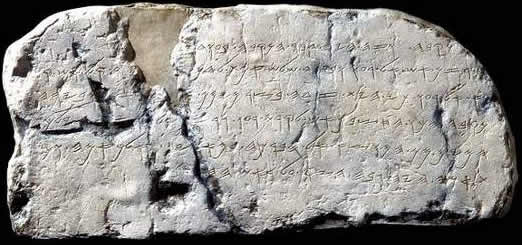 |
The Hezekiah Inscription (photo courtesy of the Washington Times) |
(ZNDA: Jerusalem) An ancient inscription memorializing Jerusalem's salvation from Assyrian invaders 2,700 years ago is to be returned to Israel from Turkey for study and public display.
Israel has been trying for about 20 years to recover the artifact, which marks one of the most important turning points in Hebrew history.
Assyrian forces under King Sennacherib controlled most of the Middle East in the early 8th century B.C. and were about to march on Jerusalem, where a defiant King Hezekiah ruled.
Anticipating a prolonged siege, Hezekiah ordered the construction of a tunnel connecting the city to the Gihon Spring outside its walls, ensuring a source of drinking water. The water collected inside the Judean capital at the Pool of Siloam, where centuries later Jesus is said in the Gospel of John to have cured a man who had been blind since birth.
An inscription inside the tunnel described the dramatic moment when stonecutters working from either end converged in the middle.
In 1880, a Jewish boy discovered the so-called Hezekiah Inscription, also known as the Siloam Inscription, engraved in ancient Hebrew letters in the tunnel's limestone wall.
"A segment of the tunnel wall's surface had been flattened and smoothed so that the inscription could be carved into the limestone," said Gabriel Barkay, a senior archaeology lecturer at the Bar-Ilan University.
Mr. Barkay said Conrad Schick, a German national who had been living in Jerusalem since 1846, publicized the find. He made a papier-mache likeness known as a gypsum plate copy and photographed the inscription.
The date of the inscription was determined on the basis of its contents and historical context.
A Greek antiquities dealer tried to remove it from the tunnel wall, but succeeded only in breaking it into several pieces.
Ottoman Turkish authorities who ruled Palestine at the time appropriated the inscription and shipped it to Istanbul — formerly Constantinople — for safekeeping. The artifact has been kept since then in the Museum of the Ancient East near the Topkapi Palace.
Jerusalem Mayor Teddy Kollek made the first attempt to retrieve the inscription for contemporary Israel two decades ago. Last month, Mayor Uri Lupolianski asked for it again at a meeting with Turkish Ambassador Namik Tan. The ambassador said it would be returned in accordance with international law as a loan rather than a restitution.
A member of the Turkish Embassy's staff in Tel Aviv said the inscription could be deposited in Jerusalem "on a long-term basis" if some kind of reciprocity was made. Otherwise, it may stay at the Israel Museum for as little as three months.
Mr. Barkay suggested that the diplomat was hoping for a loan of items dating from the Ottoman Empire's 400-year-long rule over Palestine. Most of this material is stored in Israel's state archive, he said.
The inscription's text is dramatic and vivid. According to one translation, it states:
"While the excavators were still lifting up their picks, each toward his fellow, and while there were yet three cubits to excavate, there was heard the voice of one calling to another, for there was a crevice in the rock, on the right hand. And on the day they completed the boring, the stonecutters struck pick against pick, one against the other, and the water flowed from the spring to the pool."
The tunnel through solid rock — 1,750 feet long, 15 feet high and 29 feet wide — took four years to cut, Mr. Barkay said.
He said the Hezekiah Inscription "is corroborated perfectly" by Sennacherib's written account of his campaign to subjugate Judea and conquer Jerusalem.
Several original copies of Sennacherib's cuneiform text are displayed at the British Museum in London, the Museum of Chicago's Oriental Institute and the Israel Museum in Jerusalem. His text contains a colorful comment about his dealings with King Hezekiah.
"Fear of my greatness terrified Hezekiah," it states. "He sent to me tribute: 30 talents of silver, precious stones, ivory and all sorts of gifts including women from his palace."
By then, Sennacherib had subjugated 46 other Judean cities and compelled them to pay him tribute. He said he "enclosed Hezekiah in his capital of Judea like a bird in a cage."
His father and predecessor, Sargon II, conquered the northern Kingdom of Israel and expelled the 10 tribes that inhabited it. One of the underlying causes of Sennacherib's invasion of Judea, Mr. Barkay said, was Hezekiah's formation of an anti-Assyrian coalition that included Egypt.
The prophet Isaiah opposed this policy vigorously and eloquently, speaking against tenuous alliances with unpredictable neighbors.
His condemnation is expressed in Isaiah 31:1: "Woe to them that go down to Egypt for help; and stay on horses, and trust in chariots, because [they are] many; and in horsemen, because they are very strong; but they look not unto the Holy One of Israel, neither seek the Lord!"
The Bible says the king then prayed to God that Jerusalem be spared from Assyrian attack. Sennacherib withdrew his forces shortly afterward.
Hezekiah's water-diversion project is cited in the Old Testament's II Chronicles 32:30: "It was Hezekiah who stopped up the spring of water of upper Gihon leading it downward west of the City of David," Jerusalem's ancient core.
Assessing the Wounds of an Ancient Assyrian Ruler
Courtesy of the New York Times
31 August 2007
By Wendy Moonan
(ZNDA: New York) Archaeologists are all abuzz about some enormous, newly reinstalled ninth-century B.C. Assyrian sculptures at the Bowdoin College Museum of Art in Brunswick, Me. They say they can’t wait until it reopens on Oct. 14, after a two-year, $20 million renovation and expansion, to see what curators discovered when they remounted five ancient bas reliefs from a royal compound at Nimrud in northern Iraq.
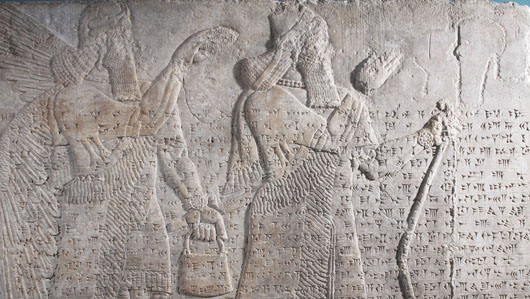 |
Detail of one of the five Assyrian reliefs in the Bowdoin College Museum of Art (courtesy of the Bowdoin College Museum of Art) |
One in particular has elicited attention. Beautifully carved in gypsum and nearly six feet tall, it depicts in profile a regal figure walking to the viewer’s right. He can be identified as a king because he wears a tall, conical hat, a symbol of power and prestige. He wears a long embroidered cape, an elaborate earring, a necklace and a bracelet with a large rosette, and carries a dagger and whetstone. He raises his right arm in a gesture of acknowledgment or greeting. His left hand holds a bow, the symbol of his patroness, the goddess of war and love.
But something is very wrong here. The king has been disfigured. His bow is broken in the middle. His right wrist and his Achilles tendons have been brutally slashed. His nose and ears are damaged, and one eye has been chipped out. The bottom of his beard has been hacked away.
Amazingly, curators discovered these “injuries” only after the reliefs were moved to the museum’s new wing from the dark rotunda in the old landmark museum building, a magnificent Renaissance-style loggia that McKim Mead and White completed in 1894.
“After the reinstallation, when we could finally see the reliefs in daylight, some 19th-century repairs became very visible, particularly the plaster infill on the panel of the king with the bow,” said Katy Kline, the director of the Bowdoin museum. “Of course all our reliefs have been around for 2,500 years — they were all roughly treated — and we knew there were some repairs, but the damage to the others didn’t seem as deliberate as it did on the one of the king and bow. The more we studied the strategic location of the cuts on it, the more we got interested.”
The defaced king is Ashurnasirpal II, an ambitious ruler of Assyria from 883 to 859 B.C. In 879 he established a new capital for his empire in Kalhu, now called Nimrud, about 20 miles southeast of Mosul. He built a vast walled city, with a citadel, temples, royal palaces and residences for thousands of people he forcibly settled there. All of the reliefs at Bowdoin are from the northwest palace there, except the one with the disfigured king.
“It probably comes from a temple in the citadel,” said Barbara N. Porter, an independent scholar and research associate at the Harvard Semitic Museum. Ms. Porter, an authority on ancient Assyrian art, has written widely on Bowdoin’s reliefs.
This year, when curators identified the plaster restorations to the king, “we had to decide if we would leave the repairs or explore the apparent damaged parts to see if there was more to learn,” said James A. Higginbotham, associate curator for ancient art at the museum. They removed the plaster additions.
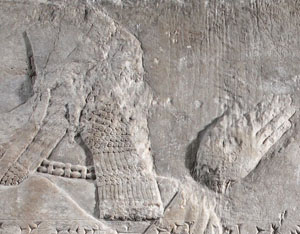 |
Assyrian relief detail showing disfigured face and slashed wrist (courtesy of the Bowdoin College Museum of Art) |
They now conclude it was the Medes tribes from the east (currently Iran) who disfigured the relief when they conquered Kalhu in 612 B.C.
“The Medes were former vassals of the Assyrians, and while they may have had some help taking Kalhu, the circumstantial evidence for the mutilation points to them,” Mr. Higginbotham said. “What’s clear is that the people who occupied the palace purposefully went about defacing certain reliefs. They were very selective.
“They saw the images of the king as embodying the power itself.” Ms. Porter added: “It’s retaliation against the visual image of an Assyrian kingship, even though Ashurnasirpal II had been dead since the 800s, and Kalhu was no longer the center of the political empire. It could be seen as a magical attack as well as a symbolic disfiguration.”
Bowdoin’s other reliefs depict the king as warrior, priest and protector of Assyria. Each has a cuneiform text in Akkadian listing his many victories and accomplishments. Often the king is accompanied by protective deities — bird-headed supernatural guardians and winged human figures — and stylized representations of the tree of life.
At one time dozens of these larger-than-life figures on stone reliefs lined the king’s throne room. Originally painted in bright colors, they were meant to intimidate visitors. In the past 150 years they have also fascinated archaeologists.
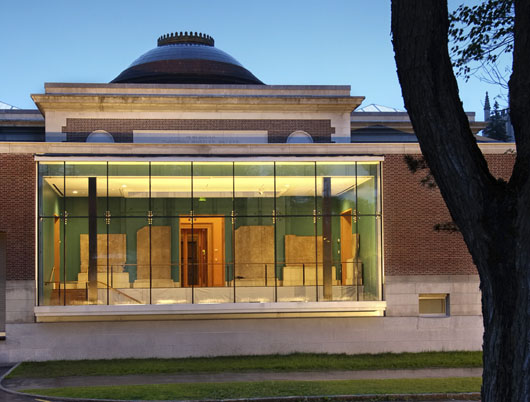 |
The Assyrian Gallery as seen through the Museum's new glass curtain wall (courtesy of the Bowdoin College Museum of Art) |
The excavation of ancient Kalhu began in the 1840s, when Austen Henry Layard, a 28-year-old British diplomat stationed in Baghdad, became convinced that a series of earth mounds along the Tigris River might be an ancient capital. He secretly hired Arab tribesmen to dig in the mounds and immediately found an ancient palace compound, complete with murals, ivories and wall carvings.
Assuming, wrongly, that it was the ancient Biblical city of Nineveh, he excavated several wall reliefs and sent them, via camel, river raft and ship, to the British Museum for safekeeping. Then he returned to England, where he was knighted for his discoveries.
“It’s possible the locals were not happy Layard was there,” Mr. Higginbotham said. “His tools were taken and he kidnapped a man to get them back. There was suspicion of foreigners.”
After Layard’s departure, archaeologists flocked to Kalhu and its extraordinary reliefs were scattered across the globe (to museums in Mumbai, Baghdad, London and New York). American missionaries in the Middle East were particularly anxious to claim them, because they thought they proved the veracity of the Bible. (Genesis 10:8-12, for example, discusses the “great city” of Calah — same as Kalhu — and how the “mighty hunter” Nimrod established the dynasty of the Assyrians.) Among those missionaries was Dr. Henri Byron Haskell, who sent five panels to his alma mater, Bowdoin, in the 1850s.
“It was the beginning of an awareness of the wider world of the Bible, a revolution really, because it confirmed the idea that the Bible was historically accurate,” Ms. Porter said. “These carvings were suddenly a blinding light on a world that up to then was essentially lost.”
The enormous carved reliefs can still evoke excitement. “We’re already planning a symposium to discuss our discoveries,” Mr. Higginbotham said.
UAT Instructor Creates Cuneiform and Hieroglyphic Translator
(ZNDA: Phoenix) University of Advancing Technology (UAT) instructor and senior web developer Joe McCormack has completed work on a web-based application that translates English words into cuneiform script from the Assyrian, Babylonian, Sumerian and the hieroglyphic script of Egyptian. The tool may be seen here: virtualsecrets.com.
The translator works by converting cuneiform and hieroglyphs, both used in the earliest forms of writing, into English words. For example, typing "I am a father" into the Ancient Egyptian translator yields hieroglyphs that roughly translate to "I am" and "father." The translator has been featured on several museum websites around the world and websites specializing in resources for the ancient world.
McCormack, a UAT web developer by trade, worked more than 1,000 hours on researching the cuneiform and hieroglyphic and building the tool and its accompanying website. Inspiration for the project stemmed from his fascination with the science fiction television series "Stargate SG-1," which featured ancient Egyptian mythology and symbols as plot points. These caught McCormack's eye and lead to his research.
The website translator engine took approximately an hour to create, with the language database occupying two hundred hours to line up cuneiforms and hieroglyphics with text descriptors and make a hierarchy to prioritize the information.
"One of the reasons something as big as what I've done hasn't been done before is that there are thousands and thousands of symbols," said McCormack.
McCormack is talking with museums and institutions to garner further exposure. In particular, the Egyptian translator has been a hit; more than half of the 1,100 daily hits stem from the Egyptian hieroglyphic alone. More than 30 countries in six continents are using the website for translations.
The University of Advancing Technology is a unique, private college that serves its student body by fostering knowledge creation and academic excellence in an environment that embraces the young technophiles of the world. With three centers of research and a suite of technology-centered undergraduate and graduate degrees, the University is a recognized leader in technology education.
For more information, contact
Alan Hromas at UAT: 602-383-8272 or send a message: click here.
Assyrian from Illinois Crafts Pentagon Memorial Components
Courtesy of Washington Post
12 September 2007
By Nick Miroff
(ZNDA: Washington) They arrived in late August on a flatbed truck from Missouri. The three long, arcing, silvery shapes were rough to the touch, their sheen buried under a mottled layer of crusted, cooled steel.
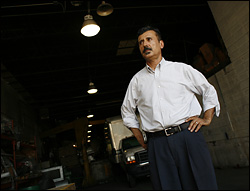 |
Abe Yousif, owner of Bucthel Metal Finishing Corp, supervises the finishing of one of the 184 Pentagon 9/11 Memorial benches in Elk Grove Village, Ill., August 28, 2007. (By John Gress for The Washington Post) |
Abe Yousif and his men quickly unloaded the strange cargo and began grinding into the metal with huge, clattering machines and hand tools. There was no time to lose. Over the next year, Yousif's small company, Bucthel Metal Finishing Corp., must custom-polish 184 of the 1,100-pound stainless steel castings, transforming them into perfectly uniform, flawlessly smooth memorial benches -- one for each of the victims who died at the Pentagon on Sept. 11, 2001.
One year from today, the first Sept. 11 memorial for the nation will open on the grounds of the Pentagon on the spot where American Airlines Flight 77 tore into the building's western side. Workers across the country -- at a foundry in Missouri, at the Pentagon and at Yousif's shop outside Chicago -- are preparing for the occasion by piecing together what will become one of the nation's most emotional, sacred sites.
The cantilevered benches arriving at Bucthel will be the memorial's central feature. Each requires nearly 100 hours of grinding, welding and polishing. Once the benches are complete, Yousif and his men will affix each with an etched nameplate corresponding to one of the lives lost that day -- the moment, Yousif says, when the metal "comes alive."
The weight of this responsibility could not be clearer to him. The Iraq-born Yousif and his 20-odd employees -- all immigrants as well -- are facing their own memories of tragedy and loss as they bring the memorial into being.
Yousif left Baghdad in 1979 at age 24, and he hasn't been back. But his 88-year-old mother is there, along with a brother and sister. A Christian family of Assyrian descent, they live now under threat of Shiite militias who have ordered them to convert to Islam or leave, Yousif said.
Since the war began, Yousif's brother's party-supply business has collapsed -- "no one is having parties anymore," Yousif explained. His sister has stopped going to work. The family rarely ventures outside.
"Every phone call you get, you hope it's not from Iraq," Yousif said. "And you always wonder what is going to happen next."
That one of the most solemn, significant tasks of completing the Pentagon Memorial would fall to an Iraqi American might seem too unlikely to be a coincidence. But the Pentagon Memorial project did not pick Yousif because he was born in Iraq. In fact, it did not pick him at all.
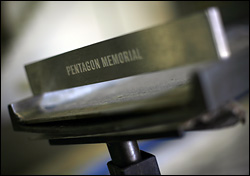 |
| One of the 184 Pentagon 9/11 Memorial benches as seen in Elk Grove Village, Ill., August 28, 2007. (By John Gress for The Washington Post) |
Yousif is a longtime subcontractor for Metaltek International, the company producing the memorial benches in Missouri. And he is not unfamiliar with high-profile jobs. He has made custom handrails for Michael Jordan, statues for the Country Music Awards, even bunny icons for the Playboy mansion. His handiwork is all over the United States.
But the Pentagon Memorial job is unlike any other, Yousif said. If he can make the benches perfect, he believes he will help others to heal. If he can make the metal shine brilliantly, they will feel hope. He wants people to run their fingers along the steel and find, in its clean, immaculate smoothness, something affirming, redeeming even, on a site now scarred by murder and death.
"Being an Arab American, you feel so sorry," Yousif said, sitting in his small office adjacent to the shop, a dim, cavernous warehouse next to a soap factory. Airplanes landing nearby at O'Hare International Airport roared overhead every few minutes, adding to the din of the grinding machines. "It's a feeling like you can contribute something good to this horrible thing if you can make [the benches] look beautiful."
For Yousif and his employees, the project is a chance to create something permanent in the heart of an adopted country. But it is also a reminder of how they got here, and of places and people left behind.
"They remind me of my country," said Vujadin "Joe" Obradovic, a 24-year-old Serbian immigrant hired by Yousif to custom-build the wooden shipping crates that will protect the memorial benches en route to the Pentagon.
The crates resemble pine-box coffins Obradovic saw as a teenager that were used for hasty burials during the 1999 NATO bombing of his country. "Anytime I see a box like this, I see the people who died years ago, friends of mine and cousins who were killed," he said.
Iraq is also on the minds of others at work on the shop floor, where metal dust swirls in the air and blackens workers' arms and faces. Edgar Caiceros's younger brother left for Iraq in July, a 21-year-old Marine fresh into his first tour.
Caiceros, 23, had wanted to join the military, too, but he never finished high school, so he went to work for Yousif instead. "It's hard to have a brother over there and be doing this," he said, wiping flecks of metal from his face during a break. Caiceros and his uncle, Hector Mora, will be grinding the memorial benches for eight, 10, 12 hours a day for the next 10 months. Both were born in Mexico.
"I start thinking how if something happens to my brother, would I do one of these pieces in his name?" Caiceros said.
Each of the memorial benches is poured from $6,000 worth of premium-grade industrial stainless steel. The benches will be arranged at the Pentagon site according to victims' ages -- from 3-year-old Dana Falkenberg to 71-year-old John D. Yamnicky. There are 125 memorials for those who died in the building and 59 for those on Flight 77.
Every 14-foot-long bench will be attached to a one-ton cement base with its own shallow, circulating pool of water flowing underneath. The seat will be covered with a natural surface, and at night, the benches' stainless steel undersides will glow from light projected upward from inside the pools. The $23 million project is being funded by private donations to the Pentagon Memorial Fund, a group formed by victims' families, and it has raised $15 million so far.
But the work must go on. And with less than a year to complete the memorial, Yousif, like others involved in the project, is watching the calendar closely.
"He thinks about this Pentagon project day and night," said his wife, Angel Yousif, also an Iraqi-born Christian. Although the company is filling other orders, "we don't talk about anything else."
Tall and thin, Abe Yousif, 54, is perpetually in a hurry. His cell phone rings every few minutes, and he punctuates each sentence with "sir," as in "We'll finish them today, sir" or "I will fax you the invoice right away, sir."
The Iraq of car bombings and sectarian violence that Yousif sees on al-Jazeera and CNN each night is unrecognizable to him, he says. In the Iraq he remembers, "you didn't know if your neighbor was Sunni or Shiite -- we all lived together."
Born in northern Iraq, Yousif grew up not far from the Kurdish city of Dahuk. His father grew apples -- "Washington apples, from America," he proudly recalls -- on a five-acre plot.
Yousif studied economics at Baghdad University, and twice Saddam Hussein came to lecture the students. They were needed in the army, Saddam told Yousif and his classmates. Yousif served for 18 months after graduation, but he no longer imagined his future in Iraq. A few months before war broke out with Iran, Yousif and his first wife left for Jordan. Relatives living in Chicago helped them secure U.S. visas.
He arrived in Chicago and worked two jobs, making school supplies in a factory and parking cars as a valet downtown. He struggled with English and froze in the winters. He saved and saved.
In 1985, Yousif founded Bucthel, choosing the name because it sounded like "Bechtel," the huge American engineering and construction firm. "It sounded serious," Yousif said.
Over two decades, Yousif expanded the business by always saying yes, always aiming to please -- "The Iraqi way," he says. Customers began calling him "Mr. No Problem" because he responded to their requests and orders, no matter how difficult, with that eager assurance.
The company had more than 40 employees when the world changed on Sept. 11, 2001. It was a "deeply sorrowful" day for Yousif, but he did not expect it would lead to the invasion of Iraq. "When you look at September 11th, none of the people involved were Iraqi, so I thought, 'We're not part of this at all.' "
Still, when President Bush sent U.S. forces into Iraq in 2003, Yousif believed it would change his country for the better. He imagined Iraq transformed into Dubai, or Qatar, a place with skyscrapers and grand boulevards. "We thought they would get rid of Saddam, and everything would be easier for Iraqis," he said.
Yousif did not foresee the rise of the insurgency and the downward spiral of violence that followed.
The killing and the chaos have scattered his family even farther since the war began. Two sisters now live in the Kurdish-controlled north. Another is a refugee in Syria. The family survives mostly on money sent by Yousif and a brother who lives in Germany.
As for his mother and two remaining siblings in Baghdad, life has withdrawn indoors, where more often than not, there is no electricity or running water. "Everyone is afraid to go to school or to work," Yousif said. "When I see the destruction of Iraq, it hurts so bad."
Still, Yousif believes the persistent violence in Iraq will give way to an equally dogged determination to rebuild. "The Iraqis don't give up," he said.
And once the memorial is complete and the benches are in place, Yousif thinks it will finally be a good time to visit Iraq. He could meet his family in the north. Maybe it will even be safe enough to go to Baghdad by then.
"Right now," he said, "I'm busy with my life over here.
|


